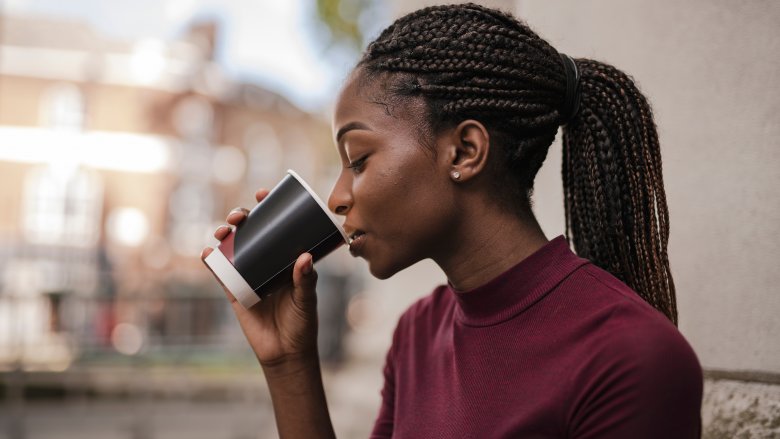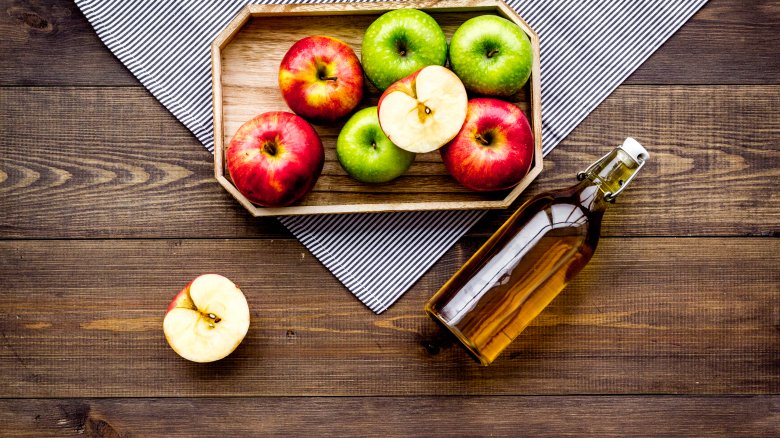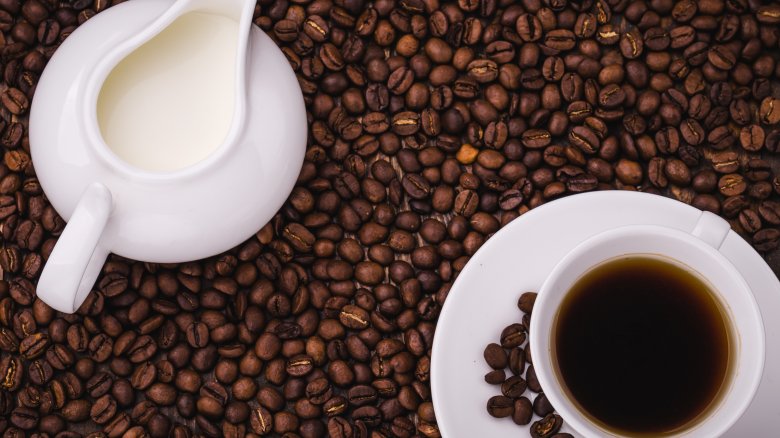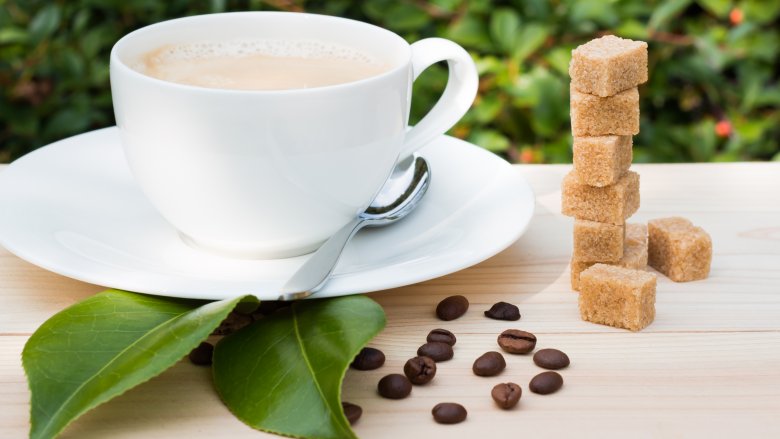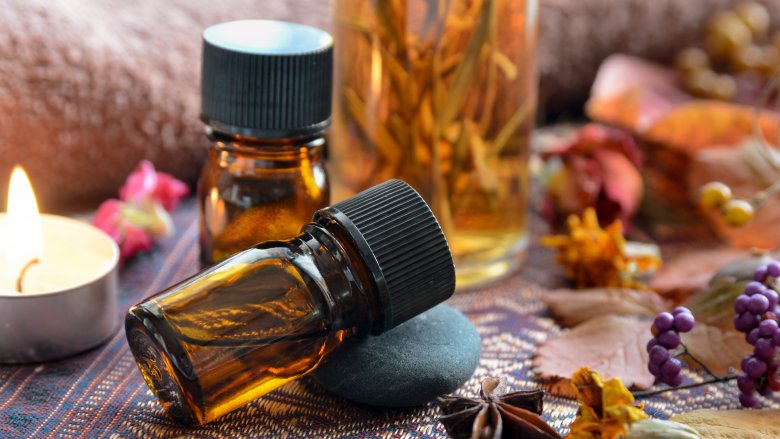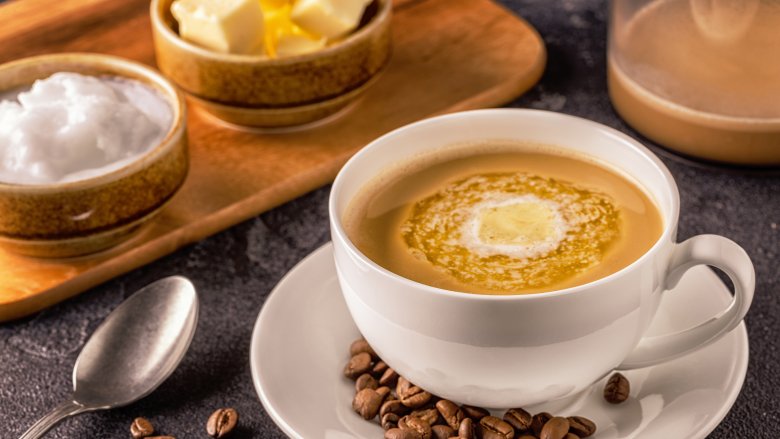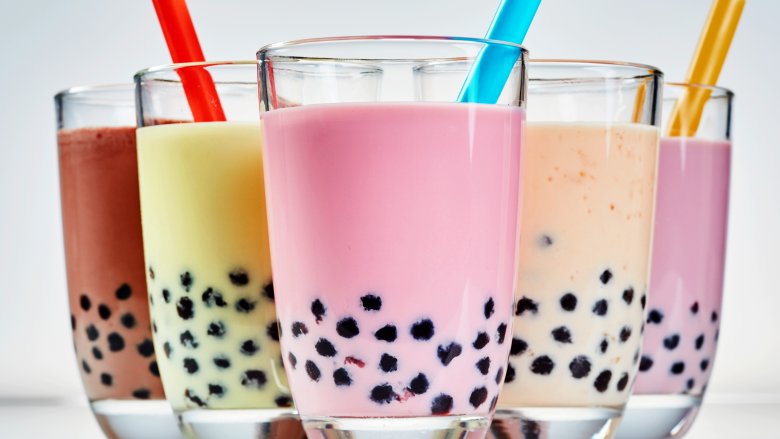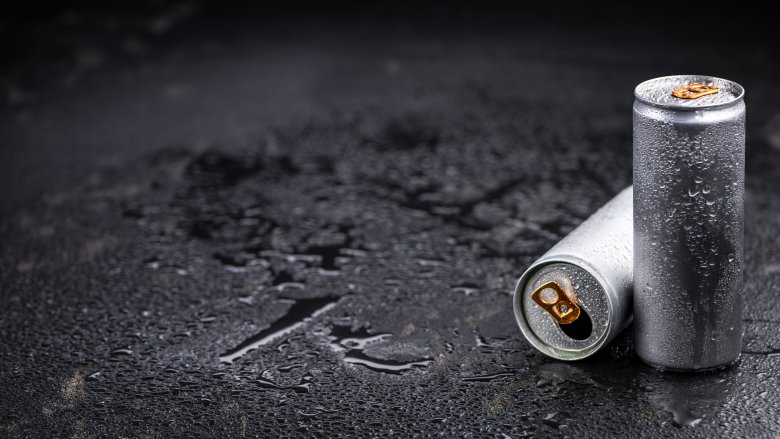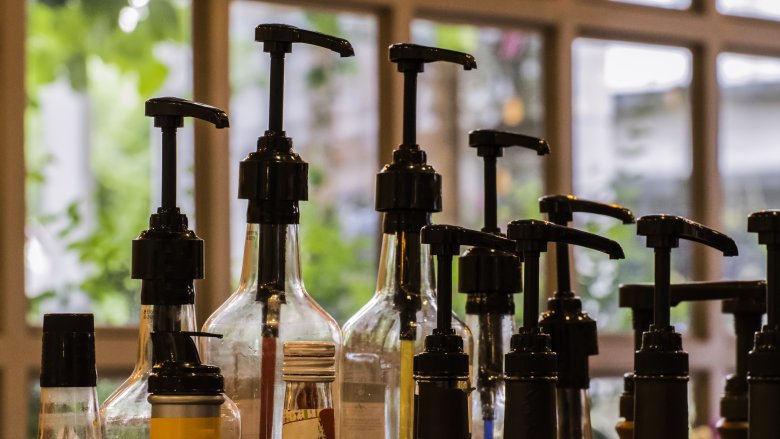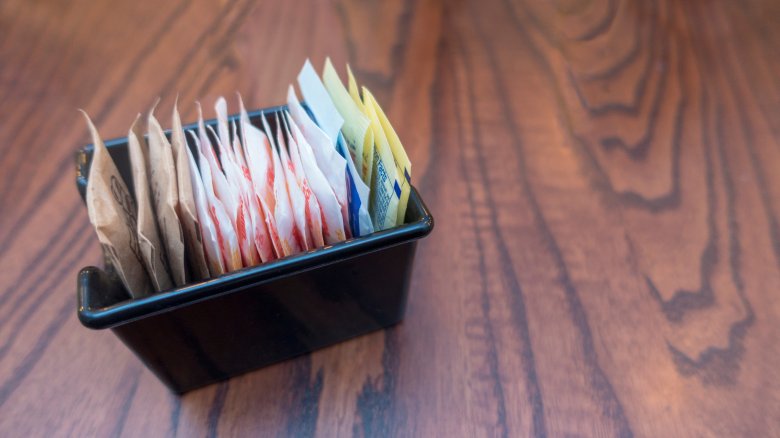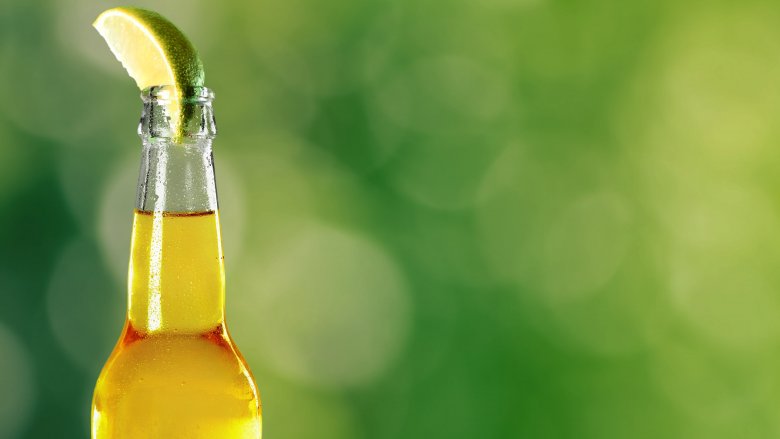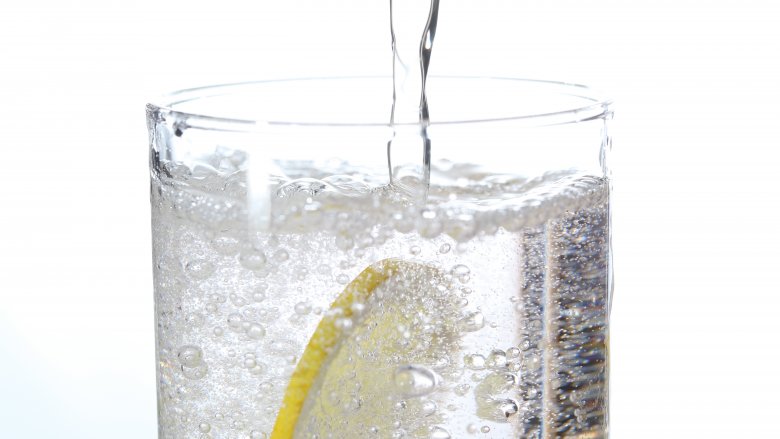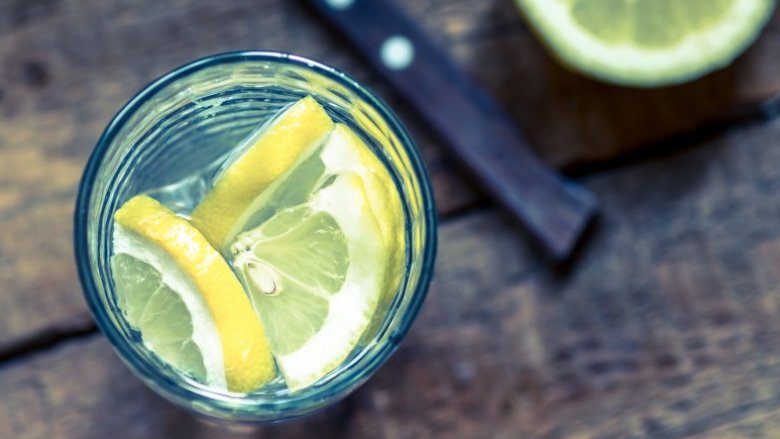Things You Should Never Put In Your Drink
With all the tough decisions we face in life, your beverage should be a simple one. Unfortunately, that's not always an easy choice, either.
Say you choose coffee in the morning, water during the day, and tea at night. Those are all perfectly fine choices, but there's still some pretty shocking ways you might be not only ruining your diet, but opening yourself up to risk of severe illness and, in one case, even injury — from a drink!
It's all down to what you put in your drink. A slice of lemon or a wedge of lime might seem harmless, it's fruit, after all. You've probably heard good things about apple cider vinegar, and you may have even made the switch from sugar to artificial sweetener, all with the best of intentions. But there are pitfalls to all of these — and other drink add-ins, and knowing what they are might help you decide whether or not you really, really need those additions to your beverage. Sometimes, you should just let the drink stand on its own, and here's why.
Apple cider vinegar
We all want a quick fix for things like cholesterol levels and weight management, and when apple cider vinegar started to be touted as a sort of miracle fat burner, tons of people got around the taste and started adding it to their drinks. While there is evidence that some of the claims are valid, Healthline says it's very, very important to keep in mind that it's only recommended in small amounts. Drink too much and you're in for some horrible side effects starting with what they call "delayed stomach emptying."
That's exactly what it sounds like — food staying in the stomach longer than normal and contributing to bloating and nausea. It can also make regulating blood sugar more difficult, and there are other problems. Studies have shown apple cider vinegar can damage tooth enamel, cause esophageal and skin burns, and can interact with certain medication (particularly diabetes medications and diuretics). Long-term studies are still years away, but it's also thought that apple cider vinegar might contribute to long-term bone loss and low potassium levels, so it's essential to do your research... and maybe skip adding this to your morning glass of water.
Non-dairy creamer
The Virginia Cooperative Extension took an in-depth look at just what you're putting in your coffee when you reach for either liquid or powdered non-dairy creamer, and it's not good news. They found that while the liquid version has a ton of highly processed sugars, the powdered version is even worse. That has trans fats and partially hydrogenated oil, and that's the stuff you want to avoid completely. They also note that sometimes, it might not even show up in the nutritional information, and you have to check the ingredients list to find it. Sneaky!
Everyday Health looked at how they can get away with that, and essentially, the serving size is so small that the fat content falls below the threshold for what legally needs to be listed. It still adds up, though, along with the calories. Before you know it, you're adding a few grams of fat and as many as 50 calories to a single cup. Not bad? Now multiply that by how many cups you drink, and you'll find you're approaching McDonald's hamburger-territory — just with your morning coffee.
Sugar
Even if you know you need to cut back on sugar, you might still think adding a teaspoon to your morning coffee isn't a big deal. But that single teaspoon is around a sixth of what Popular Science says most adults should get in the entire day, and if you have more than a few cups of coffee? It adds up quick. They also say most Americans consume around 19.5 teaspoons of sugar a day, and that's a lot more than the six to nine you're supposed to have. In the grand scheme of things, slowly cutting back on then eliminating sugar from your drinks is a super easy way to get just a little more healthy.
The news is worse if you favor iced coffee. Anyone who adds a bit of sugar to their iced coffee, says Business Insider, is basically adding a lot of bad for little good. Since sugar dissolves better at high temperatures and iced coffee is, well, cold, you're not doing much to sweeten your coffee anyway. You're just getting a big gulp of sugar at the end (or the beginning, if you use a straw). Try something like a dash of vanilla extract or cinnamon for a bit of sweetness without the incredibly unhealthy — and sometimes pointless — sugars.
Essential oils
Aromatherapy is all the rage, and regardless of how much or how little you believe essential oils do, there's one thing that isn't up for debate: you shouldn't be adding them to your drinks.
The American College of Healthcare Sciences says ingesting many oils just isn't safe — no matter what the dose — and can result in a phone call to poison control. Even the few essential oils that are safe for human consumption come with a whole series of caveats, and need to be administered by a clinical aromatherapist. They're the only ones that are going to be able to correctly prescribe the right dosage and make sure it's actually necessary — because most of the time it's not.
The National Capital Poison Center gives some excellent examples of how dangerous adding these to your drinks can be. While peppermint can help sooth gastrointestinal distress, other forms of mint — like pennyroyal — will devastate your liver. They recommend just not swallowing any of it, and calling poison control in case of an accident.
Butter and oil
It's an old saying that when things don't mix, they go together like oil and water. That's because they literally don't mix, but in spite of that, bulletproof coffee has become a thing countless people swear by. According to medical professionals, though, you might want to rethink adding butter and oil to your morning coffee.
Medical News Today determined that while there are considerable benefits to coffee — like lowering the chance of developing liver disease, diabetes, and Parkinson's — there's limited scientific research on just how good an idea it is to add MCT oil. Not only is there no proof good things can come of it, scientists do know that replacing a meal with this creamy cup of joe essentially means you're replacing vitamins and nutrients you get with breakfast with saturated fats. Not only that, but the standard bulletproof coffee recipe contains more saturated fat than the American Heart Association recommends you eat in an entire day.
And saturated fat is what is going to increase your cholesterol and your chances of stroke and heart disease, side effects you don't get with just a regular cup of coffee and a healthy breakfast.
Tapioca pearls
When bubble tea hit the scene — and social media — it was all the rage. It was fun, colorful, and it had the word "tea" in it, so you could feel justified in making a wise drink choice. Only there's a problem, and a huge part of what makes bubble tea unhealthy... are those bubbles.
They're tapioca pearls, and they're the same thing tapioca pudding comes from. (Remember that?) It might be all-natural, but this is a case where that doesn't mean the same as healthy. Reader's Digest notes those little pearls are just orbs of starch extracted from cassava root, a vegetable grown in South Africa. They're essentially just little bundles of carbs, without all the vitamins and minerals that comes when you get your carbs from other places, like whole grain wheat bread.
Then, you'll have to consider that when they're prepared, they're often boiled in sugar for as much three hours. Just how much sugar varies, but a quarter cup of pearls added to your bubble tea can raise the calorie count of your drink by at least 160 calories. Not so healthy now, is it?
Energy drinks
There's nothing quite like an evening cocktail to finish off a long, hectic day, but when it comes time to mix one up there's one thing you definitely shouldn't be adding: an energy drink. That combination comes with more dangers than you might expect.
Drink Aware says the effect of adding energy drinks to your alcohol is that it can create a state they call "wide awake drunk," and that can ultimately lead to you drinking more than you intend because you don't feel as drunk as you actually are. The combination also leads to an increased risk of side effects like insomnia, heart palpitations, and a false sense of sobriety, which can lead to all kinds of issues. A study from Northern Kentucky University found people who opted for this combination regularly were also more likely to drive drunk, binge drink, and develop a dependence on alcohol.
It's also been found that the combination of alcohol and the stimulants in energy drinks makes people more prone to panic and anxiety attacks, which is not the relaxing end to your day you were looking for.
Those flavor shots and syrups
No one likes having the same old thing every single morning, and flavor shots or syrups can seem like a great way to switch up your daily cup of joe. But Prevention calls flavor shots one of the worst things you can add to your coffee, just because there's an almost unthinkable amount of sugar in just one squirt of the stuff. If you head to Starbucks and ask for a flavor shot in your coffee, you're getting about an ounce of syrupy sweetness. That serving size of most popular syrups — like Torani — contains a whopping 19 grams of sugar and not much else. Yikes!
But, you say, you can get the sugar-free ones. There's a problem here, too; studies like a recent one from the University of Sydney (via Scientific American) have found sugar-free alternatives actually increase appetite, cravings, and ultimately lead to people eating more calories to try to satisfy those cravings. So, look at it this way — you might be paying for your sugar-free decisions come lunch-time (if you can make it until then).
Artificial sweeteners
So, you've decided to skip the sugars and give artificial sweeteners a shot instead. It's a great idea, in theory, but science says you're making a mistake.
Take the results of a study published in the Canadian Medical Association Journal. Researchers found that prolonged use of artificial sweeteners like stevia end up increasing a person's weight and body mass, interfering with natural, healthy gut bacteria, and it's possible it can even damage or weaken your cardiovascular system.
Dr. David Ludwig from the Boston Children's Hospital says (via Harvard Health) there's another problem: they can increase cravings and interfere with the way you experience healthy, sweet foods like fruit. He's found that with prolonged use of artificial sweeteners, naturally sweet foods don't taste as good, nonsweet foods — like vegetables — can become downright unappetizing, and people are more likely to turn to higher-calorie, less nutritionally beneficial foods to curb the cravings they develop. There's also a psychological factor to consider, and Ludwig says when people think they're doing something not-so-terrible by opting for artificial sweeteners, they're more likely to consume greater amounts. Those amounts, they add, are linked to an increased risk of diabetes and — potentially — cancer.
Limes (sometimes)
Picture this: it's a warm, sunny day, you're hanging out in the backyard, and you grab a Corona. You put a lime wedge in it, right? You absolutely shouldn't, because it's more dangerous than you think (via Slate).
What they're not showing in all those Corona commercials is a condition called phytophotodermatitis, and it's caused when sunlight activates a chemical found in limes. When you squeeze the limes outside and the lime juice gets on your skin, it reacts with UV rays from the sun and causes skin cells to rupture. And that, in turn, causes all kinds of skin problems of varying severity.
In fact, there's a good chance it's already happened to you and you might not have recognized it for what it really is. Symptoms can easily be mistaken for another skin condition, and include pigmentation, redness, blistering, inflammation, and soreness, similar to a mild burn or sunburn. It can take a few days to appear, the discomfort lasts for up to a week, and if you've ever noticed a burn that turns brown and hangs around for months, those are actually sings of this whole different type of lime disease.
Carbonation
If you have chronic issues that leave you feeling bloated and uncomfortable, or if you have IBS, one thing you definitely don't want to add to your drink is carbonation. According to Medical News Today, a lot of the claims made about the side effects of carbonated water — like the idea it causes bone loss or weight gain — are bogus, but there's another reason you might want to give this one a miss.
Conditions like IBS — specifically, ones that impact your gastrointestinal system — might be made worse by opting for a carbonated beverage. Sorry, SodaStream users, but while adding carbonation to even sugar- and artificial flavoring-free drinks isn't going to make you gain weight or rot your teeth, it will make you feel bloated and gassy
Johns Hopkins says that carbonation doesn't end when you drink something, and that the bubbles in your drink end up fizzing away in your GI tract. There's a chance it's giving you more than the burps, so skip this one, too. Your stomach will thank you.
Lemon
It's pretty common to be asked if you'd like a slice of lemon in your water, and it seems like a good idea. Ask yourself this, though: is it worth the risk of getting sick?
If a 2007 study from the Journal of Environmental Health is any indication, you have about a 50/50 chance of getting some bacteria with your lemon. They sampled 21 different restaurants over the course of 43 visits, and 53 percent of lemon samples had bacteria — including things like Enterococci, which St. James Hospital says is commonly found in a person's gut and can cause major infections in someone who has a compromised immune system.
They also say lemon's natural antibacterial properties aren't enough to fight off most of the contamination, and neither is alcohol. A study from the Annals of Microbiology (via Men's Health) looked at 52 different types of bacteria and whether or not they survive after being added to a drink. The short answer is that many do, and that whiskey was the only drink that showed an ability to kill off bacteria. The moral of the story? Skip the lemon (or order the whiskey).
